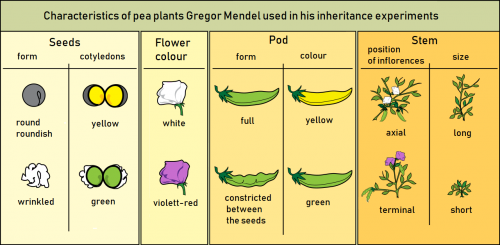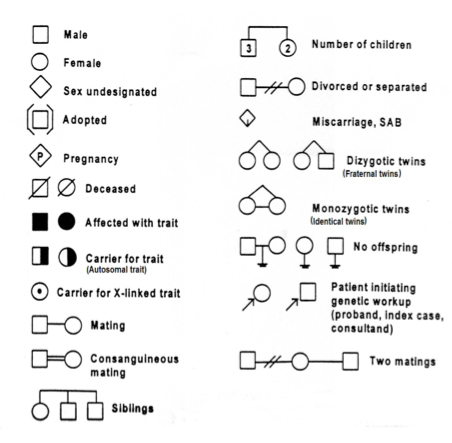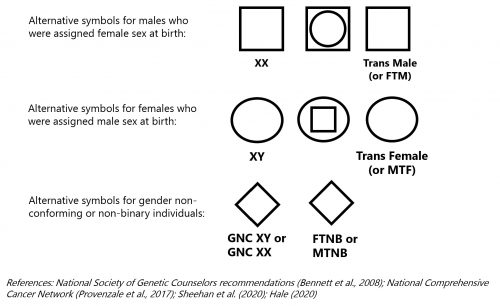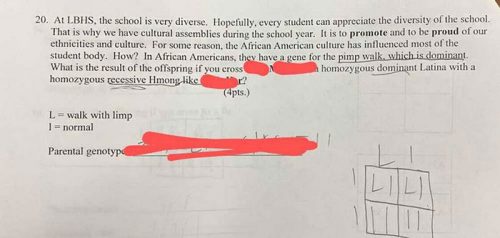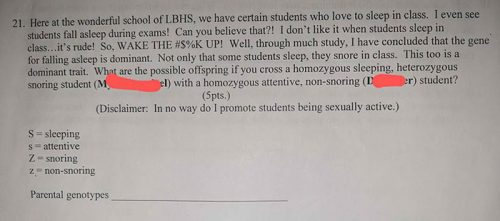I said I had to compose a simple quiz on Mendelian genetics today, and here it is. I’m drug-addled right now, so I couldn’t handle anything at all complicated, so you’ll probably laugh at how basic it is. My philosophy with these quizzes is that I just want to make sure they understand the fundamentals, and later (like next week) I give them something more challenging, and this quiz basically summarizes Mendel’s principles.
Being doped to the gills right now just guarantees that I won’t hit them with anything too tricky or difficult.
Briefly summarize Mendel’s first postulate, and explain under what conditions it fails.
Briefly summarize Mendel’s second postulate, and explain under what conditions it fails.
Briefly summarize Mendel’s third postulate, and explain under what conditions it fails.
Briefly summarize Mendel’s fourth postulate, and explain under what conditions it fails.
If you cross true-breeding vestigial winged, brick red eyed flies to true-breeding long winged scarlet eyed flies, what will the F1 progeny look like?
a. vestigial winged, scarlet eyed
b. long winged, scarlet eyed
c. vestigial winged, brick red eyed
d. long winged, brick red eyed
e. none of the above
What will the genotype of the progeny be?
a. vg+ st+
b. vg- st-
c. vg-vg- st-st-
d. vg+vg- st+st-
e. none of the above
If you cross the F1 progeny to each other, what proportion (0-1.0) of the F2s will have long wings?
If you cross the F1s to each other, what proportion (0-1.0) of the F2s will have scarlet eyes?
What proportion (0-1.0) of the F2s will have long wings AND scarlet eyes?
If you do a backcross, crossing a vestigial winged, scarlet eyed F2 to one of its F1 parents, what proportion (1-1.0) of the progeny will be long winged and brick red eyed?
In pea plants, white flowers (w) are recessive to violet flowers (W), constricted pods (c) are recessive to full pods (C), dwarf (d) is recessive to tall (D), and yellow pods (y) are recessive to green pods (Y). In your garden, you have some true breeding pea plants that are tall, white flowered, with full green pods, and another set of true breedings plants that are dwarf and violet flowered, with constricted yellow pods. By some whim of fashion, your friends would like some dwarf white flowered plants with full yellow pods.
You do a cross of your available plants. What will the progeny look like?
a. Tall white flowered with full green pods
b. Dwarf violet flowered with constricted yellow pods
c. Tall violet flowered with full green pods
d. Dwarf white flowered with constricted yellow pods
e. none of the above
None of the F1s meet your friends’ criteria. If you cross the F1s to each other, though, what proportion of the progeny will be dwarf white flowered plants with full yellow pods?
You have 10 friends. How many F2 seeds will you have to collect and grow to adulthood to find a perfect plant for each one?
Then you have a clever idea. What if you backcrossed the F1s to your existing stock of dwarf and violet flowered, with constricted yellow pods? What would be the frequency of dwarf white flowered plants with full yellow pods be in that cross?
At the end of your gardening exercise, you conclude that
a. that was easy! I should volunteer to do more gardening for my friends!
b. maybe I need to get less picky friends

